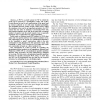Free Online Productivity Tools
i2Speak
i2Symbol
i2OCR
iTex2Img
iWeb2Print
iWeb2Shot
i2Type
iPdf2Split
iPdf2Merge
i2Bopomofo
i2Arabic
i2Style
i2Image
i2PDF
iLatex2Rtf
Sci2ools
142
click to vote
COCO
2010
Springer
2010
Springer
Derandomized Parallel Repetition of Structured PCPs
A PCP is a proof system for NP in which the proof can be checked by a probabilistic verifier. The verifier is only allowed to read a very small portion of the proof, and in return is allowed to err with some bounded probability. The probability that the verifier accepts a false proof is called the soundness error, and is an important parameter of a PCP system that one seeks to minimize. Constructing PCPs with sub-constant soundness error and, at the same time, a minimal number of queries into the proof (namely two) is especially important due to applications for inapproximability. In this work we construct such PCP verifiers, i.e., PCPs that make only two queries and have sub-constant soundness error. Our construction can be viewed as a combinatorial alternative to the "manifold vs. point" construction, which is the only construction in the literature for this parameter range. The "manifold vs. point" PCP is based on a low degree test, while our construction is base...
| Added | 03 Sep 2010 |
| Updated | 03 Sep 2010 |
| Type | Conference |
| Year | 2010 |
| Where | COCO |
| Authors | Irit Dinur, Or Meir |
Comments (0)

